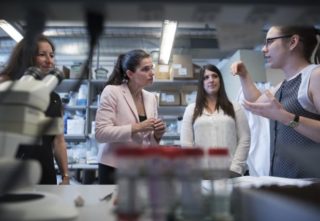Universities will have to prepare students for multiple career changes and a longer working life if they are to contribute to reducing the global inequality that is a major focus of this week’s discussion at the World Economic Forum in Davos, says the principal of McGill University.
Suzanne Fortier is the only Canadian university president who is attending the international forum of the world’s financial and government elites, this year tackling challenges from security to the impact of technology on jobs. On Monday, the annual gathering published its prediction that the world will lose 5.1 million jobs within the next five years as a result of automation and smarter technology, with health care, energy and finance likely to suffer the steepest losses.
“It brings us back to the central mission of the university, how to think, how to make leaps in knowledge, how to have imagination and rigour at the same. Because it’s quite clear that for people in university today they will have four, five, seven jobs in front of them. It’s constant reinvention of themselves and we need to prepare them for that world,” Dr. Fortier said. “They will have a longer period of work and they will have to change.”
Education is emerging as a key theme for the Canadian delegation in Davos, with Prime Minister Justin Trudeau highlighting the country’s universities as a key resource to rival the country’s natural resources. Dr. Fortier, who was president of the Natural Sciences and Engineering Research Council of Canada before arriving at McGill, was invited to the conference separately from Canada’s delegation.
Business delegates at Davos are as interested as educators in how the next generation of students is being prepared for an unpredictable labour market, she said. Novartis, the health-care company, and tech giant Siemens, for example, participated in a panel held by an elite group of the world’s top 30 university leaders.
Science – and the application of scientific methods in social sciences and humanities – is at the centre of all the conversations, Dr. Fortier said.
“When I started at NSERC 10 years ago, I used to say that what we do matters, and it will move much more to the centre of economic and political agendas. We have made that journey, we’re no longer out there,” Dr. Fortier said.
Like “a good beef bourguignon,” the ideas at Davos will take a while to simmer – but it is clear that the university in general has to be reinvented, Dr. Fortier said.
For McGill, that could partly be accomplished if the university decides to build a new, “smart campus” at the site of Montreal’s now disused Royal Victoria Hospital. Another priority is increasing international-exchange opportunities for students; Dr. Fortier is talking to other university presidents about how to make that happen.
Concerns about security, however, are emerging as a key threat to international collaboration. The WEF has highlighted migration, climate change and war as among the most likely risks this year.
“The world is in a fragile state right now. There is mobility, but there is a sense of vulnerability,” Dr. Fortier said.
Davos has been criticized in the past for being akin to an academic conference for the global elite, full of lofty ideas but short on implementation and specifics. But Dr. Fortier said she was surprised by who she was meeting.
“There’s a different group of people than I had expected. I thought it would be all businessmen. But there are people of different ages, different sectors. … The whole tone of the conference is an awareness of the global challenges facing the world.”
SIMONA CHIOSE – EDUCATION REPORTER
The Globe and Mail
Published Thursday, Jan. 21, 2016 8:10PM EST
Last updated Friday, Jan. 22, 2016 8:36AM EST

